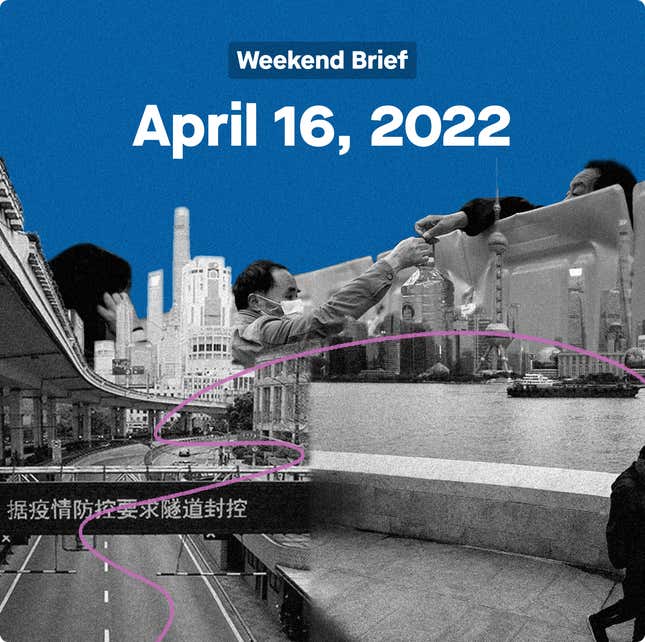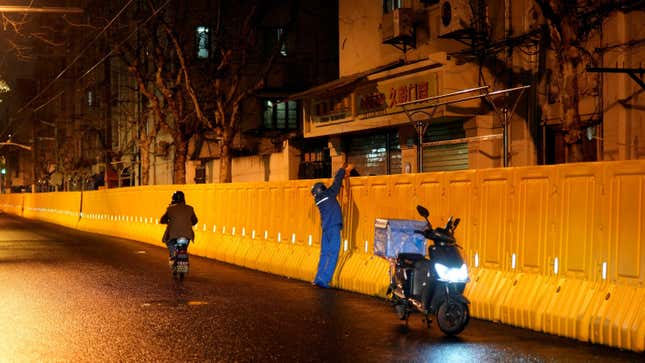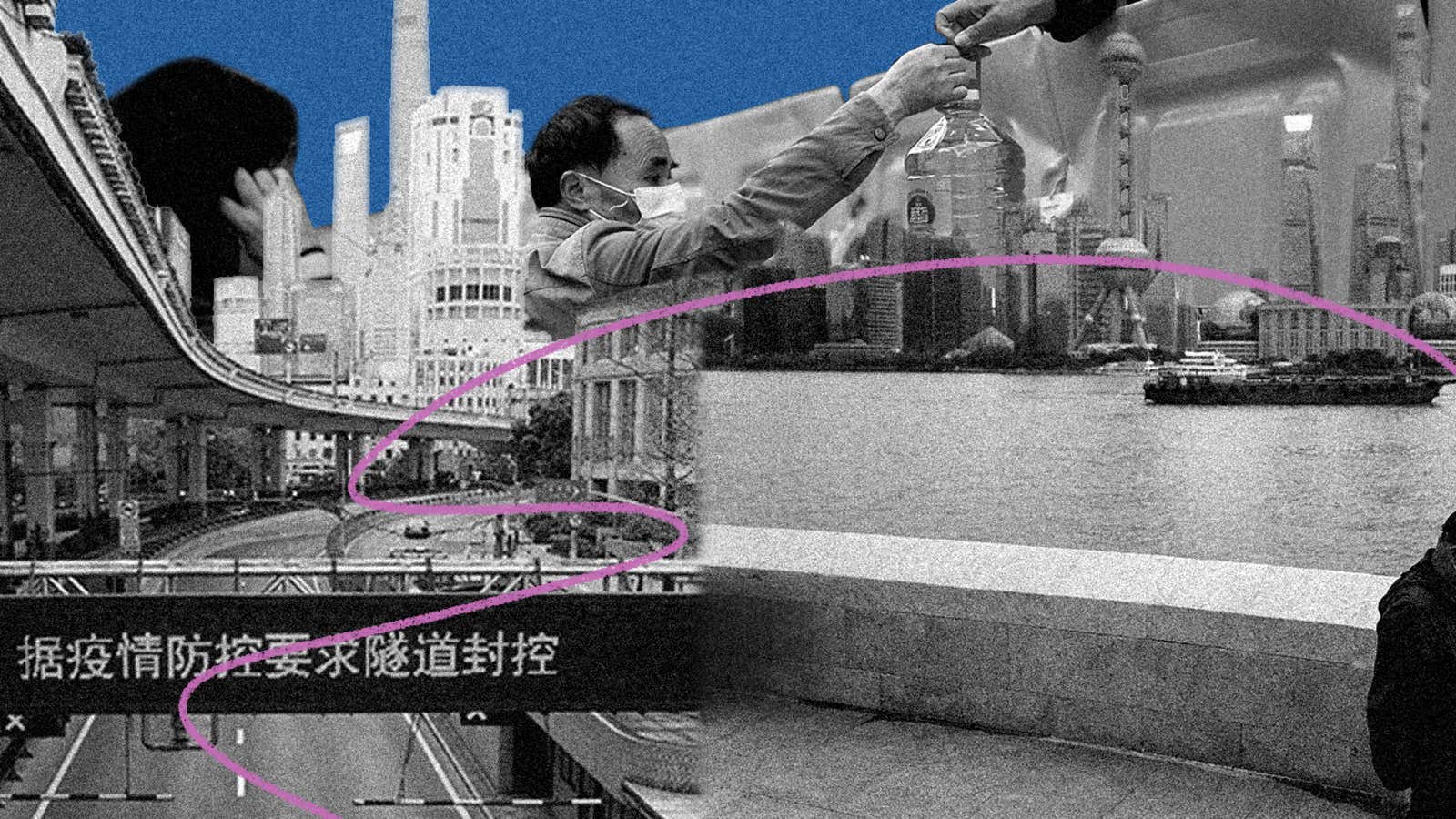
Hi Quartz members,
Guess what? We dropped our paywall! Quartz is on a mission to make the global economy more inclusive, with journalism that’s accessible to everyone. Thanks to your support—which still comes with our member-exclusive Weekend Brief and Forecast emails—we’re able to make that happen. Log in and use this link to gift membership, and/or to renew at 50% off. OK, let’s get started.
The cost of containment
Life is often a series of choices that can benefit present-day you—or future you. Money spent on a lovely meal today, for example, will provide immediate joy, but it’s less money for a retirement account to support your 65-year-old self.
At a far larger scale, countries also face such dilemmas: There are long-term goals, and short-term needs. Take China’s plan to shift away from an export- and infrastructure-driven economic model, and instead rely on domestic consumption and innovation. This pursuit of “high-quality” growth led to a tightening of real estate debt rules, which paved the way for a crisis at property developer Evergrande last year. Here Beijing is pushing change on behalf of future China, while also facing up to past decisions.
Now throw in another dilemma: China’s stringent “zero-covid” policy, which has become a hallmark of president Xi Jinping’s pandemic governance. It would be awkward to back away from the policy just months ahead of a key leadership congress—at which Xi is expected to take a third term in office—even though evidence is mounting of its human and economic toll. Chinese consumers are being hit hard by lockdowns; life in Shanghai has been reduced to a hunt for groceries. Zero-covid will also stifle China’s exports as manufacturers like Tesla lose valuable production days.
Chinese premier Li Keqiang, who intends to step down when his second term ends next year, is now frequently sounding an alarm on the economy. This week, Li warned about mounting “downward economic pressure,” and called on local officials to “strengthen the sense of urgency.” More government stimulus, including up to $2.3 trillion of local infrastructure investment, will be needed to hit Beijing’s GDP target of 5.5% this year. Given China’s long-term economic goals, zero-covid is swiftly becoming a choice with unclear present benefits, and potentially lasting consequences.
The backstory
- Shanghai is paralyzed. On March 28, the city imposed a two-stage eight-day lockdown that was meant to be lifted April 5. It wasn’t. For some, the stay-at-home orders have dragged on for weeks because of spot lockdowns that started even earlier.
- Zero-covid failed Hong Kong. The city began this year with just over 200 coronavirus deaths. But omicron’s transmissibility, plus the relatively low vaccination rates of Hong Kong’s oldest residents, have since killed some 8,000 people, more than in the entire mainland. Many of China’s elderly are also not fully vaccinated.
- Workplaces were not prepared. Bankers and factory workers in China’s urban centers have been living at their offices or plants, sleeping on makeshift beds, and jostling colleagues for bathroom time—prompting employer praise for “[treating] the company as home.”
Buying food in Shanghai

The alarm goes off, and you grab your phone to place an order with a delivery app—carrots, chicken, anything. Within minutes, you get a message that all the day’s slots are booked. So you open another app and start again. And again. This is life in China’s most sophisticated city.
While food distribution has been a challenge in past lockdowns, the suddenness and duration of Shanghai’s is creating a crisis. Supermarkets that might normally be ordered from are closed, and truckers are turned away or reluctant to come into the city, leaving even well-heeled residents to post about food shortages, join communal buying groups, and proffer barters on WeChat—alcohol for meat, for example, or toothpaste for potatoes.
“You get up at 5:55am and you try to order at 6am,” says Guo Ziwei, a business development director in Shanghai. “You keep mashing the buy button and receiving errors but hoping it’ll go through. By 6:05 all groceries are gone.”
What to watch for next
- Shanghai’s peak. In early April, the city’s new daily infections overtook the previous highest number for a Chinese city, set in 2020 in Wuhan. Daily cases are still rising by thousands, and the lockdown may not lift until that wanes.
- Cutesy propaganda. China’s covid volunteers in hazmat suits are known as big whites,” or 大白 (dà bái), a nickname that comes from the white robot in Disney’s Big Hero 6. State media is filled with anecdotes showing the dedication of big whites, another example of Beijing employing infantilized language to prettify a harsh reality.
- The covid hit to GDP. In March, French investment bank Natixis predicted that a sharp reduction in mobility in China could shave off 1.8 percentage points from its first-quarter GDP, due on Monday. For the year, forecasts hover between 4.5% and 5%.
- Increasing unemployment. With layoffs happening at Chinese tech giants like Alibaba, worries about unemployment were already growing, and lockdowns are exacerbating the concerns. What can Beijing do to create more jobs?
- 2023. A forecast from China’s civil aviation regulator describes 2023-2025 as a growth period for domestic and international travel—suggesting major changes to zero-covid won’t come before then.
Quartz questions to spark conversation
🚚 Is Walmart making trucking a six-figure job?
♻️ Can switching banks cut your carbon footprint?
🛢️ How does a country end reliance on Russian gas?
🚘 Is an electric Hummer actually helpful to the climate?
🏢 What’s in store for empty office buildings?
💉 Is it too late to vaccinate the world?
🎩 Which quality do people hate most in a boss?
5 great stories from elsewhere
🤔 “An almost instantaneous death.” Long seen as cruel, execution by firing squad is returning in some US states as lethal injection drugs grow scarce. The Marshall Projects reports on how death row prisoners are even requesting this archaic punishment.
💵 Girls just wanna have scams. Celebrities like Gwyneth Paltrow are stepping into the crypto and NFT space, bucking web3’s boys-club reputation. But The Washington Post suggests they might be girl-bossing too close to the sun.
📚 Have books, will travel. Book Riot builds a photo-rich history of bookmobiles, which started democratizing reading in the 1800s, peaked in the 1960s, celebrated a revival in the 1990s, and could be staging a comeback today.
🦄 Flutterwave under fire. As Africa’s fintech darling, Flutterwave’s reputation belies new allegations against founder and CEO Olugbenga Agboola. West Africa Weekly details charges of workplace bullying and stock-option fraud that are rocking the global startup scene.
🚚 Canada’s tow truck mafia. Organized crime is taking over Ontario’s tow truck market, prompting threats, beatings, and firebombs. The Drive explains how deregulation and flawed policing have escalated the turf wars between mobbed-up drivers.
Thanks for reading! And don’t hesitate to reach out with comments, questions, or topics you want to know more about.
Best wishes for a balanced weekend,
—Jane Li, China tech reporter
—Tripti Lahiri, Asia bureau chief
